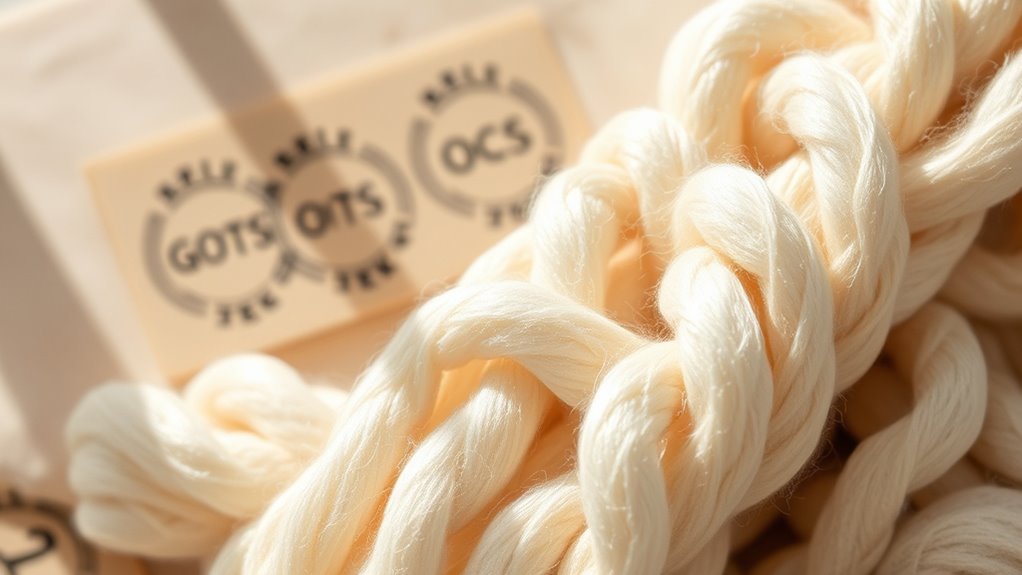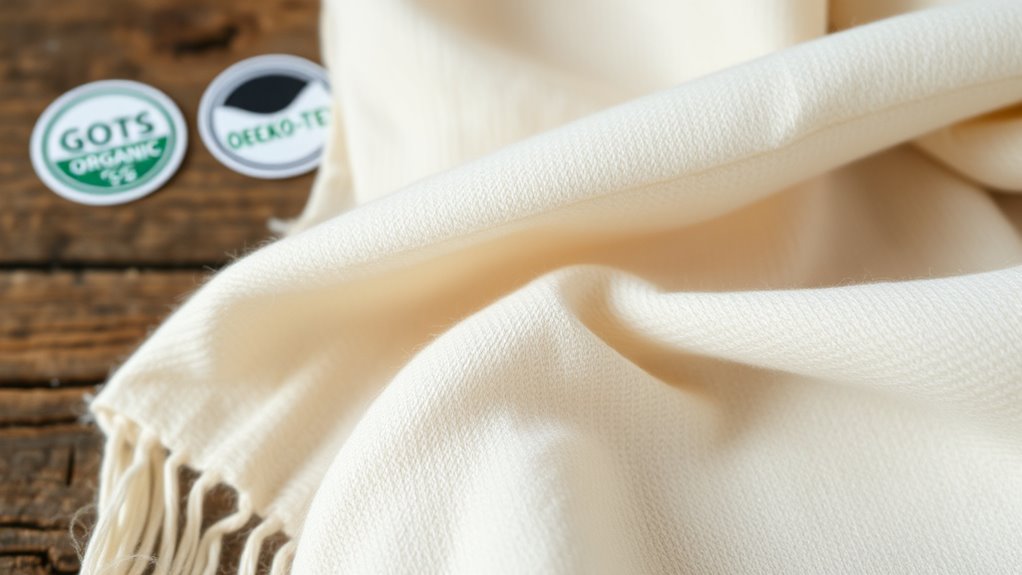Understanding organic cotton certifications helps you make smarter, eco-friendly choices. GOTS is the most all-encompassing standard, covering everything from farming to manufacturing, ensuring sustainable and safe practices. OCS verifies the organic content throughout the supply chain, maintaining transparency. OEKO‑TEX tests finished textiles for harmful chemicals, ensuring safety for you. Knowing what these labels truly mean can guide your selections, and if you look closer, you’ll discover even more about what separates responsible textiles from the rest.
Key Takeaways
- GOTS certifies the entire supply chain for environmentally and socially responsible organic textiles through strict audits and testing.
- OCS verifies the organic content and integrity of finished products, ensuring accurate organic claims via chain-of-custody certification.
- OEKO‑TEX Standard 100 tests textiles for harmful substances, focusing on human safety rather than organic farming practices.
- GOTS emphasizes sustainable farming and fair labor, while OCS ensures traceability from farm to final product.
- Certifications like GOTS, OCS, and OEKO‑TEX help consumers identify safe, eco-friendly, and responsibly produced organic cotton products.

Organic cotton certifications are vital for guaranteeing that the cotton you choose is grown sustainably and without harmful chemicals. When you see labels like GOTS, OCS, or OEKO‑TEX, you’re looking at proof that the product meets specific sustainability standards through rigorous certification processes. These processes verify that the cotton has been produced responsibly, with minimal environmental impact and safe working conditions. Understanding what these certifications entail helps you make more informed choices and supports sustainable practices in the fashion and textile industries.
The Global Organic Textile Standard (GOTS) is widely regarded as the most all-encompassing certification for organic textiles. It covers the entire supply chain, from farming to manufacturing, ensuring that every step adheres to strict sustainability standards. To achieve GOTS certification, farming practices must avoid synthetic fertilizers and pesticides, focusing instead on natural alternatives. The certification process involves regular audits and testing to confirm compliance, guaranteeing that the cotton is genuinely organic and produced ethically. When you see GOTS on a product, you can be confident that it meets some of the highest standards for environmental and social responsibility.
The Organic Content Standard (OCS) is another key certification that verifies the organic integrity of cotton throughout the supply chain. Unlike GOTS, which emphasizes farming practices, OCS primarily tracks the organic content in finished products. The certification process involves chain-of-custody certification, meaning each link in the supply chain must document and verify the organic content. This transparency allows you to trust that the cotton in your clothing is genuinely organic, even if the final product isn’t fully certified under GOTS. OCS helps maintain transparency and accountability, ensuring that organic claims are accurate and verifiable.
OEKO‑TEX Standard 100 focuses less on farming practices and more on the safety of the finished textile products. It tests for harmful substances and ensures that the final product is safe for human use. While it doesn’t guarantee organic farming, OEKO‑TEX provides assurance that the textile has been produced without hazardous chemicals, which is vital for sensitive skin and environmentally conscious consumers. The certification process involves extensive testing and strict criteria, so when you see OEKO‑TEX labels, you can trust that the product is free from dangerous substances. Additionally, colorfastness and durability are often evaluated to ensure long-lasting quality in OEKO‑TEX certified textiles.
Frequently Asked Questions
How Do Certifications Impact the Price of Organic Cotton Products?
You’ll notice that certifications often lead to a price premium on organic cotton products, influenced by the costs of meeting strict standards. This can affect your perception of quality and value, making certified items seem more trustworthy and environmentally friendly. While certifications do raise prices, they assure you of genuine organic practices, which can justify paying more and enhance your confidence in the product’s authenticity and sustainability.
Can Non-Certified Organic Cotton Still Be Environmentally Friendly?
You might wonder if non-certified organic cotton can still be eco-friendly. While certifications like GOTS ensure strict adherence to sustainable farming practices, some farmers use eco-friendly alternatives without formal certification. It’s possible that non-certified cotton employs sustainable methods, but without certification, it’s harder to verify. To truly support environmentally conscious choices, look for transparent practices and verified eco-friendly alternatives, even if the product isn’t officially certified.
What Are the Main Differences Between GOTS, OCS, and OEKO-TEX?
When comparing GOTS, OCS, and OEKO‑TEX, you’ll notice they each have distinct certification processes that affect market credibility. GOTS is the most rigorous, certifying organic fibers and sustainable practices. OCS verifies organic content but isn’t as strict. OEKO‑TEX focuses on chemical safety and environmental standards, not organic farming. Understanding these differences helps you select products aligned with your values and guarantees genuine eco-friendly qualities.
How Often Are Organic Cotton Certifications Renewed or Reviewed?
Think of certification renewal like watering a plant—you need to do it regularly to keep things thriving. Organic cotton certifications typically undergo review every one to two years, depending on the certifying body. This review frequency guarantees standards are maintained and updated as needed. You should check with each certifier for specific renewal timelines, but staying on top of these schedules guarantees your compliance and trust in your organic products.
Are There Regional Variations in Organic Cotton Certification Standards?
You’ll find regional standards vary, affecting organic cotton certification variability across countries. Different regions may have unique requirements, making it important to check each certification’s specific standards. For example, some regions emphasize stricter chemical use regulations, while others focus on environmental impact. This means certification processes might differ, so understanding regional standards helps you verify the authenticity of organic claims and guarantees you’re supporting truly sustainable practices globally.
Conclusion
Understanding certifications like GOTS, OCS, and Oeko‑Tex helps you make smarter choices, knowing exactly what’s on your clothes. Did you know that over 60% of organic cotton products worldwide now carry at least one of these labels? That means more eco-friendly, ethically produced options are available to you than ever before. So next time you shop, look for these certifications — they’re your assurance of quality, sustainability, and peace of mind.









